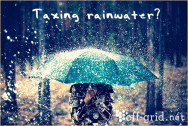
Taxing rainwater in the dry west US
What will they think of next?
Western water law means collecting rainwater was legal only a few years ago in some states. Now Colorado is actually taxing collection. And others are likely to follow.
Most of us never think about who gets to use the drops of rain that fall from the sky. But it’s an increasingly pertinent question as more people look to collect rainwater as a way to conserve water, or while living off the grid or save money on water bills.
As a result, many states in the arid West are now asking whether rain barrels are allowed under existing law and policy and, in some cases, are setting limits on the practice of rainwater catchment.
Colorado has gone further than any of its neighbors by requiring a permit for any rainwater collection. Meanwhile, Utah put rainwater harvesting rules into effect in 2010 with some restrictions, and Washington legalized rainwater collection in 2009, while leaving the state the “ability to restrict if there are negative effects on instream values or existing water rights.”
Why this worry over rainwater harvesting?
If everyone captures the rain that falls on rooftops and through downspouts of homes, the argument goes, then the water will never reach the rivers and streams. If this happens, existing water users may not be able to access their rights to use the water.
This concern, however, overstates the issue and risks missing more concrete opportunities for water conservation and efficiency, says Adell Amos, Associate Dean for Academic Affairs, Associate Professor of Environmental and Natural Resources Law, University of Oregon. A more effective way to address decreasing water supply would be for states to apply the legal principles prohibiting waste and demanding reasonable water use, which have long been embedded in any right to use water.
U.S. water law, east and west
Both the rainwater collectors and the existing water rights holders, such as irrigators or municipalities with water rights to river flows or groundwater sources, believe they have a fully private interest in any water they use.
Throughout the United States, however, the law recognizes the public nature of water. Under the public trust doctrine, each state holds title to the water within the state in trust for the people of the state.
Given the competing demands for water use, principles of U.S. law seek to balance these competing needs and uses to ensure that the public’s rights to water are protected.
In western states, farm owners often have rights to use water which can often be delivered through irrigation ditches, such as this one in Colorado. question_everything/flickr, CC BY-NC-ND
In the eastern United States, there is the riparian system that protects reasonable use of water among all landowners along rivers or streams. In the western part of the country, the doctrine of prior appropriation requires a permit to use water based on showing that the …
